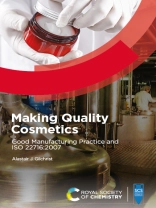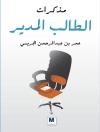Cosmetics manufacture is a dynamic and vibrant industry with companies varying from the very small scale, working in their own home, to much larger enterprises. With such variable companies there is the risk of equally variable quality in manufacturing. The International Organization for Standards (ISO) provides guidelines on good manufacturing processes for the cosmetics industry. However, not everyone working in cosmetics has a scientific or engineering backgrounds and understanding and meeting the ISO requirements can be daunting.
Whether you are a small business just starting out or an established company looking to expand, Making Quality Cosmetics will guide you through the requirements of the ISO standard. Calling on more than 35 years of experience in the cosmetics sector the author covers every aspect of the manufacturing set up and process, as well as discussing other regulations that may need to be considered, especially in larger facilities. With technical advice ranging from choosing equipment and raw materials, to assessing and auditing contractors this book will help you make sure your products are of the highest quality.
Jadual kandungan
Introduction;Personnel;Premises;Equipment;Raw Materials and Packaging Components;Manufacturing and Packaging Operations;Finished Products;Quality Control and Quality Assurance;Waste;Sub-contracting;Non-conformances, Deviations and Corrective and Preventative Actions [CAPA];Complaints, Recalls and Adverse Reactions;Change Control;Audits; Documentation;Health and Safety and Environment;Other Legislation;Afterword and the 10 Golden Rules of GMP
Mengenai Pengarang
Alastair Gilchrist is a graduate in chemistry from the University of Manchester. He started his working life in the quality control department of Sterling Winthrop in Newcastle-upon-Tyne. After a few years he joined Bristol Myers Company as a development chemist working on Clairol hair care and hair colour brands as well as Mum deodorants and Mr Muscle household products. An opportunity arose to become manufacturing manager where making cosmetics became Alastair’s day job. Mr Muscle was sold but Clairol relaunched Herbal Essences which brought a whole new set of challenges in a factory not ready for what became a very successful brand. Alastair successfully led the re-engineering of the manufacturing department to cope with the new production demands learning a lot about hygienic engineering in a short space of time. After the sale of Clairol to Proctor and Gamble Alastair set up an independent consultancy, Gilchrist Technical Services and he has continued to work mainly in the cosmetics industry since 2003 helping companies start-up cosmetic manufacturing or improve the facilities that they have.












